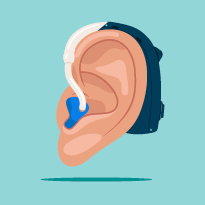New Study: Hearing Aids Help in Fight Against Dementia
Recent Investigation Reinforces Importance of Improved Hearing for Brain Support
Often we talk about ties between hearing and brain health. With both the ears and the brain playing such active roles in sound perception and human connection, it’s no wonder that problems with one of those critical functions could potentially affect the other. This includes the risk of dementia, which can rise significantly with hearing loss.
That’s why we’re excited to talk about new research further showing the potential power of hearing aids in fighting dementia. Using hearing technology may help reduce the odds of developing this debilitating disease by nearly 50%, per a study published over the summer in U.K. medical journal The Lancet. We’re going to break it down, but first let’s dive a little into the brain’s role in hearing.
How Do Ears and the Brain Work Together?
You may have come across the saying, “You hear with your brain — not your ears.” Your ears actually do have a co-starring part in hearing, but often people don’t realize just how prominently the brain figures into the equation. Like your cardiovascular and circulatory systems that collaborate to move blood throughout the body, ears and the brain also work together toward a common goal.
It’s a pretty fascinating process. The ears receive sounds before transforming them into electrical signals that are then sent to the brain for processing. The brain, recognizing and interpreting the sounds, uses the ears to help orient body position, focus the listener’s attention on desired sounds, and separate relevant information from competing noise.
With hearing loss, however, the ear has less ability to sense sound and transmit those signals through the auditory nerve and on to the brain for processing. In turn, straining to hear can tax the brain, which may have to work harder to process sound. That may reduce the brain’s capacity for other crucial functions, such as thinking, concentrating, and remembering.
What Is Dementia?
Dementia is a progressive neurological disorder typically leading to reduced cognitive functioning, such as the capacity to reason, recall information, and even communicate. The condition, which affects over 55 million people on a global scale and sees close to 10 million incidences annually, is often associated with aging but isn’t necessarily an inevitable part of growing older.
Sometimes people may confuse dementia and Alzheimer’s disease. Though related, they’re not synonymous. “Dementia” is an umbrella term for severe cognitive decline. Alzheimer’s is the most common type of dementia, characterized by progressive brain changes leading to memory loss, cognitive decline, and shifts in behavior.
Dementia takes not only a significant cognitive, physical, and mental toll but also an economic one. Public-health researchers estimate annual global costs of 1.3 trillion U.S. dollars as of 2019, with about half associated with informal caregiving by loved ones. The disorder ranks as the seventh leading cause of death and significantly contributes to the prevalence of disability and dependence among seniors.
What’s the Link Between Hearing Loss and Dementia?
In a previous post, we discussed some of the ties investigators have shown between hearing loss and cognitive decline in older adults. The connections are pretty alarming, with data showing evidence of accelerated brain shrinkage in the presence of hearing loss. Research has also shown other risks such as up to five times’ greater odds of dementia and earlier onset of cognitive decline.
Earlier this year, a Johns Hopkins Bloomberg School of Public Health-led study further illustrated the heightened risk that hearing loss can pose regarding dementia. They announced findings that older adults with more severe forms of hearing loss have a significantly higher risk of dementia. The investigation uncovered a 61% greater prevalence of dementia over those with normal hearing.
The study was encouraging in reinforcing the difference hearing aid technology can make. Like an increasing number of studies, the findings showed potential benefits of better hearing in keeping the threat of dementia at bay. According to the investigators, hearing aid use was associated with a 32% lower prevalence of dementia among those with moderate or severe hearing loss.
What Does the New Study Say About Hearing Aids & Dementia?
The great news about hearing aids’ potential role in staving off cognitive decline continues! One of the latest developments is that hearing intervention for older adults may stall the loss of thinking and memory capabilities by nearly 50%. It’s a pretty significant finding in the battle against cognitive decline and dementia, which continues to increase as the global population ages.
The study, “Hearing Intervention Versus Health Education Control To Reduce Cognitive Decline In Older Adults With Hearing Loss in the USA (ACHIEVE): A Multicentre, Randomised Controlled Trial,” was published over the summer, offering a whole new window into the importance of hearing aids in helping preserve brain health.
It not only served as the largest-ever randomized, controlled clinical trial of its kind — with close to 1,000 people ages 70 to 84 — but focused on the crucial question “Can treating hearing loss reduce cognitive decline over three years in older adults with hearing loss and without substantial cognitive impairment?”
Researchers in the publicly funded study found that:
- The combined interventionof hearing aids and audiologic counseling delayed deterioration of thinking and memory by 48% in seniors at greater risk of cognitive decline.
- When analyzing both participant groupstogether — the hearing intervention recipients and the health education control — neither approach was superior during the three-year investigation.
- The most significant changeoccurred among the group that was older and had more cognition and dementia risk factors, potentially indicating that people in this category may stand to gain the most in a three-year period.
- The healthy volunteer group at decreased risk of cognitive decline did not see an effect from the hearing intervention, but that could simply mean that they needed a longer observation time.
Several theories and possibilities about the “why” abound, but the study wasn’t quite conclusive on exactly how the hearing interventions potentially slow or reduce cognitive decline in older populations. Hearing intervention, however, was noted by the study’s authors as underused, virtually free of medical risk, and proven to curb cognitive decline.
7 Tips to Fighting Dementia
No single route to preventing dementia exists yet, but researchers are always working to uncover its many mysteries. In the meantime, you can take steps to help reduce your risk now. Take action such as:
- Engaging in regular physical activity, such as walking, jogging, swimming, wheelchair yoga, seated leg raises, or dancing, which can help promote better blood flow to the brain, reduce inflammation, and support overall brain health.
- Sticking to healthful eating, which can include a balanced diet rich in fruits, vegetables, whole grains, nuts, fish, and lean proteins — a combination that can contribute to brain health — while limiting processed foods, saturated fats, and sugary drinks.
- Keeping mentally active by challenging your brain with activities such as learning about unfamiliar subjects, enjoying crosswords, diving into a thousand-piece jigsaw puzzle, adopting a new skill, taking on challenging projects, or engaging in hobbies that stimulate cognitive functioning.
- Managing chronic conditions like diabetes, hypertension, depression, and hearing loss — some of the most common health issues affecting people around the world — which can increase the risk of dementia when left unaddressed.
- Enjoying quality sleep, which starts with prioritizing sufficient and restorative slumber as an important part of everyday living. Regularly ensuring a good night’s rest plays a crucial role in supporting brain health and cognitive functioning.
- Avoiding smoking and excess alcohol consumption. These habits, both of which are also associated with other serious health conditions such as cardiovascular disease and some cancers, have been linked to a higher risk of cognitive decline and dementia.
- Maintaining an active social life and meaningful relationships — whether gathering with family for weekly game nights, hitting the museum and other fun places with friends, or volunteering with others on causes you value — is associated with lower risk of cognitive decline and dementia.
As you can see, taking care of your hearing also helps take care of your brain. Together, we can help turn the tide of dementia risk by helping support one of your most important senses. So don’t wait. If it’s been a while since your last hearing checkup or listening seems more difficult than it used to be, contact us to book a hearing evaluation today!













